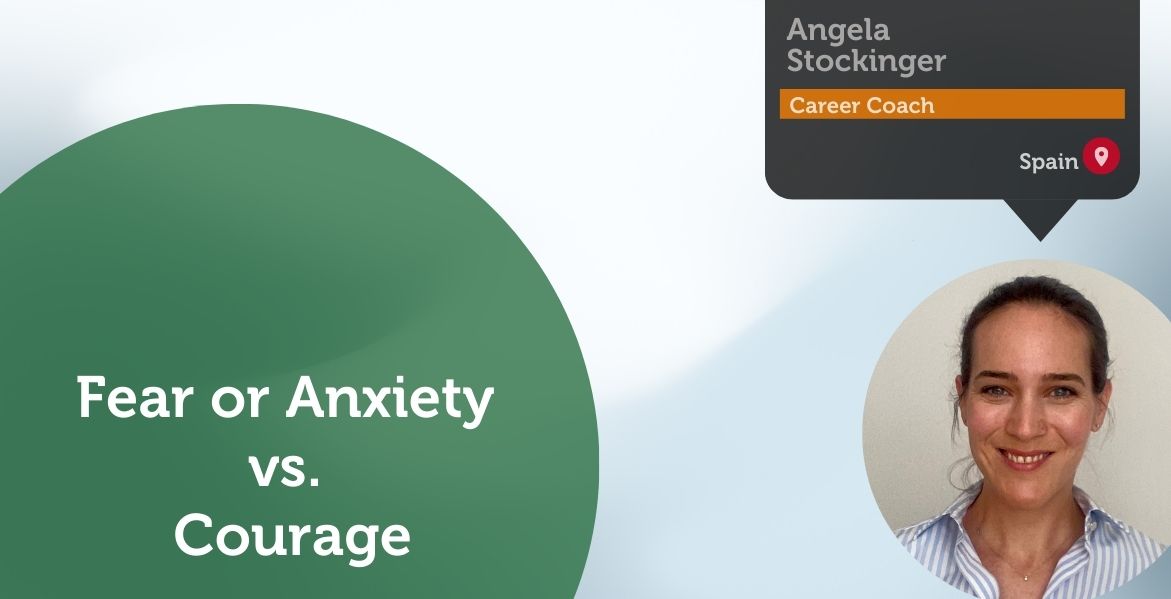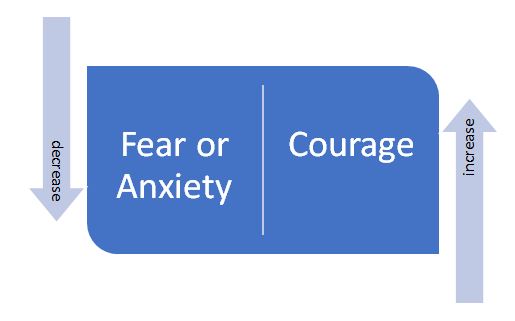A Coaching Power Tool By Angela Stockinger, Career Coach, SPAIN

Fear or Anxiety vs. Courage: Reflection on My Coaching Experience
Since starting to coach, I have been able to witness a handful of clients having significant realizations during their sessions. Because of these moments of truth, they started to understand themselves better and shifted their perspective because of the new awareness. Based on my limited experience in coaching, focusing on the WHY, on understanding where reactions, behaviors, or decisions come from is often key to introducing a new perspective and igniting change. Evoking awareness with powerful questions while supporting the client with space can remove mental obstacles and unlock new ways of thinking. I observed a big energy shift, even relief after the clients had a moment of truth with themselves.
My Perspective on Fear or Anxiety vs. Courage
To me, it seems that clients often want either a plan, more clarity or to understand themselves better as their coaching goal. The motivation often comes from a desire for change, a level of unhappiness or dissatisfaction. For whatever reason, they have not taken a step towards the desired outcome themselves yet and mention feelings of “being stuck” and/or “lost”. Both concepts – to me – have often fear and anxiety as core emotions underneath. The feeling of being hesitant, and frozen in a place or time can be based on fear of moving forward. The feeling of being overwhelmed, not seeing clearly, and not knowing can be based on anxiety.
Fear is a very deep, primitive human emotion that involves a biochemical response and an emotional response. It alerts us to the presence of the danger of any kind – real or imaginative. The biochemical response is what we feel in our body when experiencing fear, for instance, sweating or an increased heart rate. It can be very different depending on the individual – some people enjoy the sense of fear when jumping out of an airplane with a parachute – some avoid any fear-inducing situations at all costs. While the perception of fear can be positive, for this power tool, I will focus on fear in the context of a negative emotional response moving forward.
Fear frequently shows up with symptoms such as feelings of overwhelm, upset, or out of control.
Fear and anxiety can manifest with similar symptoms but are not the same emotion and should not be used as interchangeable terms. “…Fear is a reaction to a known and understood threat, whereas anxiety follows from an unknown, expected, or poorly defined threat.”[1]Anxiety is defined by vague feelings of unpleasantness and apprehension related to the possibility of something bad happening, or a negative outcome – it is based on our mind’s interpretation of possible danger.
In my coaching, understanding the difference between fear and anxiety is important. Can the client identify a unique threat causing the current emotional state? Is the client holding back because of a vague feeling of something bad could happen? The difference might guide my questions when exploring with the client and trying to evoke awareness.
Based on these learnings, I have created my power tool

Fear and anxiety are omnipresent in modern society – and here I want to clarify I am speaking from a Western European perspective. This is the world and society I live in, as a Millennial by generation, trying to understand and navigate its complexities while observing other societies across the globe.
I believe we are influenced by the constant fear and anxiety of making a wrongful decision. The sociologist Heinz Bude has described it as follows: “Anxiety springs from the knowledge that everything is open but nothing is meaningless. Our entire lives seem to be on the line at every single moment. We can take detours, take breaks or shift our focus, but these attempts must make sense and contribute to the fulfillment of our life’s purpose. The fear of simply drifting through life is hard to bear. The stress of anxiety is the stress of meaning.”[2]
With this in mind, what is the flip side of fear or anxiety? When clients say they need a plan or more clarity – what will it do to them? What are they really looking for? When challenging a client using these questions, the response often is that it will generate a positive feeling inside them, peace of mind, and a feeling better about themselves. To me what it takes to get there is courage. The courage to dig deeper, the courage to face hard truths when reflecting on what is in your control, the courage to identify negative feelings, the courage to – at times – accept that you are not ready to move on and take this as a learning. Courage will help deviate from standard practice and make decisions, but it might be a long process to get there.
Courage is defined as the “mental or moral strength to venture, persevere, and withstand danger, fear, or difficulty”[3]. However, in my coaching, it does not need to manifest in heroic actions. It is about daily acts of courage that will support the client in moving towards their defined goal; the focus is on taking small steps and actions that they can find the courage for and commit to and start a learning process.
Exploring Fear or Anxiety
- What (feelings) come(s) up while you are sharing?
- What are you afraid of?
- What is the real challenge for you?
- What is true about this?
Exploring Courage
- What would you like to happen?
- What else is possible?
- What can you do to unblock this?
- What does it mean to be brave?
References
https://www.verywellmind.com/the-psychology-of-fear-2671696
https://www.verywellmind.com/fear-and-anxiety-differences-and-similarities-2584399
https://www.litfestbergen.no/en/litfestbergen-2019/essays/living-in-a-society-of-fear/
https://www.merriam-webster.com/dictionary/courage